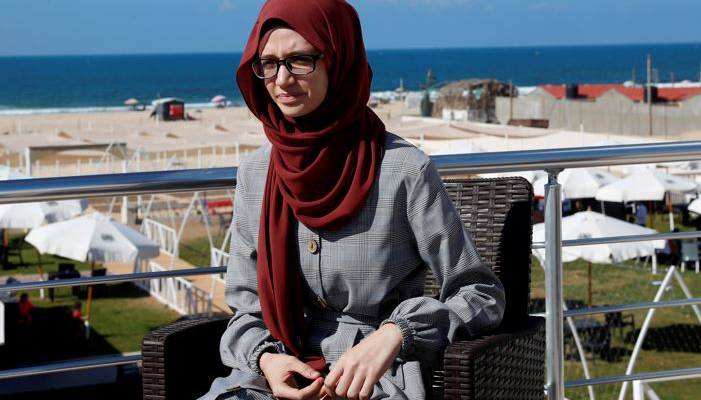The woman was turned back — not by Israel or Egypt, which have imposed a 14-year blockade on the Gaza Strip — but because of a male guardianship law enacted by Hamas.
By Associated Press
Afaf al-Najar had found a way out of Gaza.
The 19-year-old won a scholarship to study communications in Turkey, secured all the necessary travel documents and even paid $500 to skip the long lines at the Rafah crossing with Egypt.
But when she arrived at the border on Sept. 21 she was turned back — not by Israel or Egypt, which have imposed a 14-year blockade on the Gaza Strip — but because of a male guardianship law enacted by the Islamic terrorist group Hamas, which rules the territory.
“I honestly broke down,” she said, describing the moment border officials removed her luggage from the bus. “My eyes started pouring, I could not even stand up. They had to bring a chair for me… I felt my dream is being robbed.”
Travel in and out of Gaza, a coastal territory that is home to more than 2 million Palestinians, has been severely restricted since 2007, when Hamas seized power from rival Palestinian forces. Israel, which has fought four wars with Hamas, most recently in May, says the blockade is needed to keep the terrorists from rearming.
Hamas has repeatedly demanded the lifting of the blockade. But in February, an Islamic court run by Hamas issued a notice saying that unaccompanied women must get permission from a male “guardian” — a husband, relative, or even a son — to travel outside the territory.
After a backlash led by human rights groups, Hamas authorities amended the ruling to drop the requirement. Instead, it said that a male relative can petition a court to prevent a woman from traveling if it would result in “absolute harm.” Women cannot prevent men from traveling.
Hamas has only taken sporadic steps over the years to impose Sharia, or Islamic law, on already conservative Gaza, and even then has usually backed down in the face of criticism. It does not share the extreme ideology of more radical factions such as the Islamic State group.
But the amended law has remained in effect.
Al-Najar’s father filed a petition, and the court prevented her from traveling so that it could consider it. She lives with her mother, who is separated from her father, and says he cut off all contact with her in May. He could not be reached for comment.
Hamas officials did not respond to repeated requests for comment.
Human Rights Watch, a New York-based group that is deeply critical of the blockade, called on Hamas to lift its restrictions.
“Hamas’s authorities should lift the travel ban on Afaf al-Najar and the Supreme Judicial Council should withdraw its notice, so that women in Gaza can travel without discriminatory restrictions,” it said.
After being turned back at the border, al-Najar appealed to a number of local human rights groups, but said they appeared reluctant to assist her, fearing reprisal from Hamas. Eventually, she filed a petition against the ban.
Her father failed to show up at the first hearing, causing it to be postponed. Before it adjourned, the judge asked her why she was going abroad and suggested she could just as easily study in one of Gaza’s universities.
Al-Najar, who speaks fluent English and teaches the language, aspires to be a journalist. She says a multi-cultural country like Turkey provides opportunities that don’t exist in Gaza, which is largely cut off from the outside world.
The hearing was postponed a second time because her father’s attorney was sick. It was postponed a third time on Wednesday because his new lawyer said he needed time to study the case.
The scholarship’s validity was extended until the end of the year, but if al-Najar does not make it to Turkey by then, she will lose it.
But she’s not giving up.
“I realized no one is going to help me but myself, and I realized that I have to be strong now to fight for my rights,” she said. “Instead of crying in my room and letting myself down, I decided to fight. I chose to fight for the first time in my life.”
Do You Love Israel? Make a Donation - Show Your Support!
Donate to vital charities that help protect Israeli citizens and inspire millions around the world to support Israel too!
Now more than ever, Israel needs your help to fight and win the war -- including on the battlefield of public opinion.
Antisemitism, anti-Israel bias and boycotts are out of control. Israel's enemies are inciting terror and violence against innocent Israelis and Jews around the world. Help us fight back!























